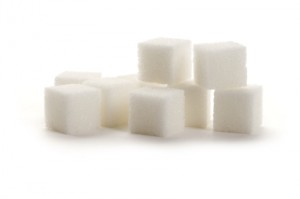About a year ago I was sitting in a coffee shop in Topeka, Kansas with my husband, eating a vegan oatmeal cookie and doing some reading online. One of the articles I came across was ‘Is Sugar Toxic?‘ by The New York Times. And by the time I finished the 6,000+ word story, I was deeply regretting that cookie.
The article discussed the research of Dr. Robert Lustig – a pediatric endocrinologist at the University of California – who has deemed sugar as the major cause of most of the health-related diseases Americans are facing today like obesity, type 2 diabetes, hypertension and heart disease. And he believes 75% of these diseases are preventable if we’d just cut back on the sweet stuff.
Dr. Sanjay Gupta recently did a special on Dr. Lustig on 60 Minutes, and the story seemed to catch the attention of other media outlets. This has brought the ‘sugar is toxic’ discussion back full circle, forcing Americans once again to consider whether or not it’s their sugar habit that’s making them sick.
So this got us wondering about sweeteners. Are sugar and sweeteners the same thing? And are they both harmful to our health? Registered dietitian and author of the ‘F-Factor Diet,’ Tanya Zuckerbrot, offered her expertise on the topic when we spoke.
She says the biggest difference between sugar and sweeteners is their make up. Sugar is an edible crystalline substance that is derived from sugarcane or sugar beet. It’s also the term for easily metabolized carbohydrates, and is also known as sucrose, which comes in several varieties like household sugar, lactose (milk sugar), and fructose (fruit sugar).
Sweeteners, on the other hand, are natural or artificial additives incorporated into foods to add sweetness, and are commonly used as sugar substitutes.
Calorically, says Zuckerbrot, there is a difference between sugar and non-caloric sweeteners, since a large teaspoon of sugar can be 23 calorie and non-caloric sweeteners contain zero calories. But the most noticeable is the difference in the taste. Non-caloric sweeteners are many times sweeter than table sugar.
So do they affect our body differently? Zuckerbrot says yes.
When we consume sugar, it enters our bloodstream quickly, which is why snacks with natural sugars like fruit can make us feel better quickly when we’re hungry. Our cells pick it up from the blood, use it for energy, and it regulates our blood sugar. But when we’re eating too much sugar, it stays in our bloodstream and results in high blood sugar. And this, over time, can lead to insulin resistance and diabetes, says Zuckerbrot.
But most sweeteners, on the other hand, either pass through the body without being absorbed or break down without creating energy because they consist of chemically-altered molecules.
So should we be more concerned about sugar or sweeteners? Or should there be equal concern?
Zuckerbrot says that even though sugar is natural, consuming excessive amounts of it can cause severe adverse effects. This was confirmed in a study at UC Davis, which showed people consuming 25 percent or more of their calories as fructose or high fructose corn syrup showed a significant increase in heart disease and diabetes.
Research concerning sweeteners is less telling. In the past, scientists have tried studying the connection between artificial sweeteners and cancer, but according to the most current research from the National Cancer Institute, sweeteners haven’t been related to the development of cancer.
So while Zuckerbrot recommends that you shouldn’t be scarfing artificial sweeteners by the spoonful, if you’re concerned about your sugar intake, it’s OK to replace sugary items with ones made from artificial sweeteners to reduce your risk for heart disease and diabetes.
In case this has you worried about your sugar intake, the USDA recommends adults following a 2,000 calorie diet limit their sugar intake to 40 grams per day, which is the equivalent of 10 teaspoons of sugar or one 12-ounce bottle of Coke.
In summary, neither sweeteners nor sugar are necessarily detrimental to your health. But then again, that depends on who you ask. Dr. Lustig would recommend that males consume no more than 150 calories from sugar a day, and for women, only 100. And others would consider that extreme. But no matter whose advice you ascribe to, practicing moderation and cutting back where you can are key to ensuring you stay far from the risk of diseases like diabetes and heart disease.
Also Read:
10 Breakfast Foods With as Much Sugar as a Candy Bar
Setting Sugar Straight: What Matters Most for Weight Management
